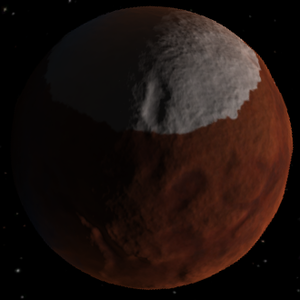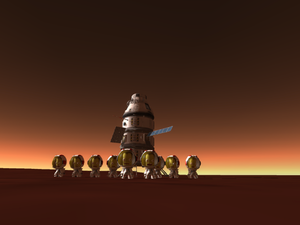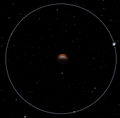Duna/ja
| ドゥナ
(Duna) | ||
| 軌道からみたドゥナ | ||
| 惑星 周回 カーボル | ||
| 軌道の特徴 | ||
| 軌道長半径 | 20 726 155 264 m [Note 1] | |
| 軌道遠点 | 21 783 189 163 m [Note 1] | |
| 軌道近点 | 19 669 121 365 m [Note 1] | |
| 軌道離心率 | 0.051 | |
| 軌道傾斜角 | 0.06 ° | |
| 近点引数 | 0 ° | |
| 昇交点黄経 | 135.5 ° | |
| 平均近点角 | 3.14 rad (で 0秒 UT) | |
| 軌道周期 | 17 315 400 秒 | |
| 801 d 3 h 50 m 0.1 s | ||
| 会合周期 | 19 645 697.3 秒 | |
| 軌道速度 | 7 147 - 7 915 m/秒 | |
| 体格的特徴 | ||
| 赤道半径 | 320 000 m | |
| 赤道周長 | 2 010 619 m | |
| 表面積 | 1.2867964×1012 m2 | |
| 質量 | 4.5154270×1021 kg | |
| 標準重力パラメータ | 3.0136321×1011 m3/秒2 | |
| 密度 | 32 897.302 kg/m3 | |
| 表面重力 | 2.94 m/秒2 (0.3 g) | |
| 宇宙速度 | 1 372.41 m/秒 | |
| 恒星回転周期 | 65 517.859 秒 | |
| 3 d 0 h 11 m 57.9 s | ||
| 太陽の日 | 65 766.707 秒 | |
| 3 d 0 h 16 m 6.7 s | ||
| 恒星回転速度 | 30.688 m/秒 | |
| 同期軌道 | 2 880.00 km | |
| 作用圏 | 47 921 949 m [Note 1] | |
| 大気の特性 | ||
| 大気の有無 | はい | |
| 大気圧 | 6.75500 kPa | |
| 0.066667 atm | ||
| 大気圏高度 | 50 000 m | |
| 6.7×10-8 atm | ||
| 気温最低 | -123.15 °C 150 K | |
| 気温最高 | -40.15 °C 233 K | |
| 酸素存在 | いいえ | |
| サイエンスポイント倍率 | ||
| 着陸 | 8 | |
| 着水 | N/A | |
| 低空 | 5 | |
| 大気圏上層部 | 5 | |
| 低高度宇宙 | 7 | |
| 高高度宇宙 | 5 | |
| 回収 | 5 | |
|
| ||
DunaはKerbol系第四の惑星で、Kerbal Space Programにおける火星のようなものです。赤い惑星で極地には氷があり、衛星Ikeを抱えています。 Ike's size and proximity tidally locks it and Duna to each other.
適切なエアロブレーキを用いれば、KerbinからDuna周回軌道までへの往復飛行に必要なdelta-vはおよそ1700 m/sで済み、他のどの惑星よりも少ない。Dunaはその軌道傾斜の少なさから、多くの場合において最も接近しやすい惑星である。
tutorialにてDunaへの往き方帰り方を解説している。
Contents
ゲーム内での説明
| 「 | 一生懸命目を細めれば見える赤い点としては知られているが、Dunaは長い間Kerbal類にとって不思議な存在だった。 緑とは全くもって正反対の鮮やかな赤色のあの星は畏怖の対象としてずっと扱われて来た。 — Kerbal天文学会 |
」 |
地勢
Dunaの地形は高度124mから8264mの範囲に及んでいる。山岳地帯に機体を着陸させるには大気が薄く十分なエアロブレーキを行うことが出来ないため非常に危険である。極地の氷が広大なのも大気の薄さに由来する。
Dunaにはいくつかクレーターがあるがいずれも侵食が激しく、風によるものと推測される。
いくつかの海(濃い色の表土に覆われた平原部)は高度0m地帯で、エアロブレーキの恩恵も受けやすく安全且つ面白みのない着陸が出来る。These may have been lakes when the planet may have had liquid on its surface in the past.
Duna地表にはイースターエッグが存在している。
大気
Dunaの大気圏は高度41,446mまであるが、大気密度は海面高度でもKerbinの20%しかなく、高度が上がるにつれ、同高度での差はさらに大きくなる。 Duna最高峰頂上における大気密度は高度0mの21%にまで減少する。比較のためKerbinの最高峰を例にすると、海面高度からは45%までしか減少しない。この低密度大気はパラシュートの準展開が低高度になりすぎる原因となり、Mk25 Parachuteの場合で10kmより上、それ以外のパラシュートでは9km以下まで落ち込む。
大気を持つ天体の中でもDunaの大気は最も薄く、Joolの衛星Laytheの大気のほうが密度も高度も勝っている程である。大気は赤または茶色を帯びておりThe atmosphere appears to have a reddish or brownish tone itself. On the poles the illuminated atmosphere is coloured although the surface is white.
着陸
エアロブレーキを活用することで燃料を大幅に節約しながら減速することが出来る。 An aerobraking maneuverでは浅い入射角で進入し、低平地の着陸目標に向けて大気圏内で時間を最大限稼ぐ必要があります。 One estimate for a good aerobraking height is 13,000 meters, which will then allow a relatively low delta-V burn at the apoapsis to create a stable orbit safely within Ike's reign of chaos.
他の天体の大気と同様に、Dunaの大気も高度上昇とともに指数関数的(3000m単位で)に薄くなっていく。一般的に高度あたりのDunaの大気圧は以下のようになっている。[1]
大気があるのでパラシュートは展開可能だが、Dunaの大気密度では安全な着陸速度まで減速するのは難しく、ロケットエンジンでの補助減速は必須である。
飛行
高度5000m以下であればDunaの薄い大気であっても翼で十分な揚力を得ることができる。酸素が含まれていないためジェットエンジンは作動できないが、他の推進方法を利用すれば動力飛行が可能である。航空機による滑走着陸も可能である。
Lifting off
An ascent to Low Duna Orbit from the surface typically requires around 1500 to 2000 m/s in Delta-V to reach a 42 km altitude traveling at roughly 950 m/s.
The following table gives terminal velocities at different Duna altitudes, which also the velocities at which a ship should travel for a fuel-optimal ascent from Duna, given the game's model of atmospheric drag.[2]
| Altitude (m) | Velocity (m/s) |
|---|---|
| 0 | 212 |
| 1000 | 231 |
| 2000 | 252 |
| 3000 | 274 |
| 5000 | 324 |
| 8000 | 418 |
| 10000 | 495 |
| 13000 | 638 |
| 15000 | 756 |
| 20000 | 1.16×103 |
Orbital Statistics
The synchronous orbit of Duna is at an altitude of 2 880.00 km above Duna. The speed of the satellite is 306.88 m/秒 and it has an orbital period resonating with 1 Duna day (18.2 hours or 65517.859375 seconds). However, this is the same altitude at which Ike orbits, so unless a ship's orbit is perfectly precise, it will eventually be captured by Ike.
For a semi-synchronous orbit of ½ Duna day (9.1 hours or 32758.9295 seconds) an orbit of 1 695.87 km above Duna is needed with a velocity of 386.65 m/秒.
Observation of Ike
Ike's orbit keeps it directly above a short range of Dunar longitudes. The average Duna longitude that Ike tends to stay directly above (at the Zenith) is 6 degrees east, but the eccentricity of Ike's orbit causes the exact longitude to oscillate between about 2 degrees and 10 degrees east and makes Ike appear to grow slightly larger and smaller to an observer on the surface of Duna. The latitude at which Ike is in the Zenith also oscillates between 0.2 degrees south and 0.2 degrees north due to Ike's orbital inclination, making Ike appear to rotate upwards and downwards as viewed from the surface, but due to the extremely small orbital inclination, this effect is nearly imperceptible. These phenomena together are known as libration. The oscillation in Ike's position above the horizon allows areas from 88°W to 80°W and 92°E to 100°E on Duna to observe Ike rise and set at least partially across the horizon, as can any areas north of 89.8°N or south of 89.8°S.
Interplanetary Travel
From altitude orbit around Duna, the delta-V needed to reach the orbits of other celestials is:
| Body | Delta-V | |
|---|---|---|
| Ike | ~300 m/s | |
| Kerbin | ~620 m/s | |
| Dres | ~820 m/s | |
| Eve | ~1080 m/s | |
| Jool | ~1350 m/s | |
| Eeloo | ~1580 m/s | |
| Moho | ~2100 m/s | |
Reference Frames
| 時間加速中 | 最低高度 |
|---|---|
| 1× | どこでも |
| 5× | 50 000 m (大気圏以上) |
| 10× | 50 000 m (大気圏以上) |
| 50× | 60 000 m |
| 100× | 100 000 m |
| 1 000× | 300 000 m |
| 10 000× | 600 000 m |
| 100 000× | 800 000 m |
ギャラリー
Duna at sunrise
変更点
- 外観変更
- ささいな外観変更
- 実装
Trivia
- Duna's name may be either a reference to its desert landscape or a reference to the Frank Herbert novel Dune.
- The low-lying areas near Duna's equator make a shape resembling Europe.
- On the surface of Duna, there is a large monument carved in the likeness of a Kerbal face, alluding to the infamous "Face of Mars" discovered in the Cydonia Mensae region of Mars during the 1970's.
- Buried deep under the surface, there is a small camera, similar to the design on the Curiosity rover.
- One anomalous feature on Duna is a small, pyramid-like hill emitting an SSTV signal. When decrypted, it shows a diagram-like image of three figures standing next to the hill itself, implying that Duna was once inhabited or visited before.
Notes
- ↑ A LV-N Atomic Rocket Motor has a specific impulse of 220 in 1 atm, 800 in vacuum, and the following at various Duna altitudes:
altitude (m) 2 100 300 500 1460 2420 3000 4272 5000 10000 specific impulse 684.1 687.8 695.1 701.8 728.7 748.2 757.3 772.1 778.1 795.9 - ↑ http://forum.kerbalspaceprogram.com/showthread.php/6664-Mini-challenge-max-altitude-with-this-supplied-spacecraft?p=100912&viewfull=1#post100912





















